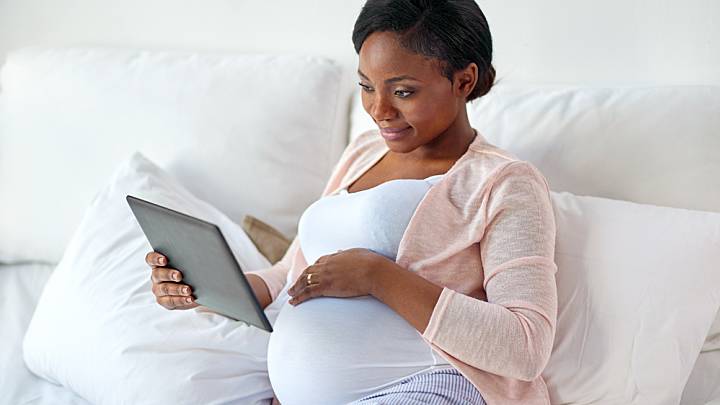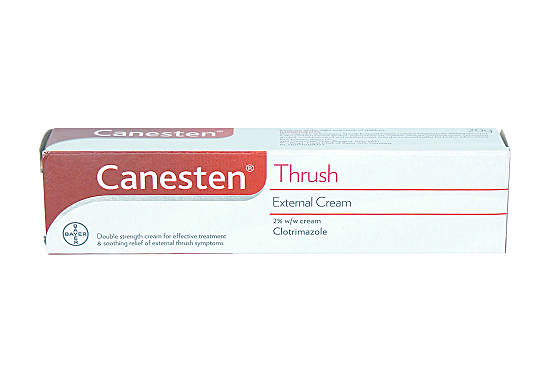Thrush in Pregnancy

Medically reviewed by
Dr Kathryn BasfordLast reviewed: 11 Apr 2019
Can thrush harm my baby during pregnancy?

Thrush is a very common condition to get during pregnancy, especially during the third trimester. It affects up to one in five pregnant women. Thrush in pregnancy is usually caused by the hormonal changes that happen as the pregnancy goes on.
What is thrush?
Thrush is an infection that can affect the mouth, the nipples, or the area in and around your vagina. It’s caused by a type of yeast called Candida. Lots of small organisms like Candida live on your skin, mouth, and genitals without normally causing any problems. Thrush happens when something causes a change in the normal balance of these organisms that leads to an overgrowth of Candida.
It’s very common to get thrush in or around the vagina in pregnancy, especially during the third trimester. Hormonal changes that happen as your pregnancy goes on can affect the balance of small organisms living around your vagina, causing thrush. This causes symptoms like:
- itchiness or soreness around the entrance of the vagina
- thick, white vaginal discharge
- pain during sex
- a burning or stinging sensation when you pee
Will having thrush when I’m pregnant affect my baby?
No, there is no evidence that having thrush when you’re pregnant can harm the baby. You can relax knowing that your baby is safe, even if you get a thrush infection during your pregnancy.
What if I have thrush while I’m giving birth?
If you’re having vaginal thrush as you’re giving birth, it’s possible to pass thrush on to your baby. This risk is small, and happens in only about 2% of cases where a woman has thrush while giving birth, or 1 in 50.
Even though the yeast responsible for thrush is found in most adults without causing any problems, a baby’s immune system is not yet developed and their body won’t be able to stop an overgrowth of the yeast as easily.
You can lower your risk of passing thrush on to your baby by getting medical help for any thrush infections you get during your pregnancy. See a doctor or pharmacist if you think you have the symptoms of thrush. They’ll be able to advise you on the best way to manage your symptoms.
Thrush in babies is usually harmless and easy to treat. If your baby gets thrush in the mouth, you may see white patches on their mouth and tongue or a white film around their lips. This whitish substance is difficult to wipe away, unlike milk spots. They might also become fussy or difficult to nurse because of the soreness. If your baby develops thrush in the nappy area, you might notice a nappy rash.
from £15.99
from £15.99
from £17.99

No results found.
Please check your spelling or try another treatment name.
Does thrush affect breastfeeding?
It’s possible to get thrush on the skin on and around the nipples. If you get thrush in this area, you may get quite severe pain in both nipples when you breastfeed. This pain can last for up to an hour after your baby has fed.
If you have thrush on your nipples, you can pass thrush on to your baby when you breastfeed. Thrush is usually harmless and easy to treat in both mothers and babies, so having thrush shouldn’t put you off breastfeeding.
If either you or your baby has thrush, both of you will need to be treated because thrush can easily be spread between you and your baby. Your GP would be able to prescribe treatment for you and your baby.
If you or your baby has thrush and you’re breastfeeding, you should:
- avoid sharing towels between family members
- wash your hands before and after changing your baby’s nappies
- sterilise clothing, dummies, or toys that have come into contact with areas affected by thrush. This includes milk bottle teats and breastfeeding bras
- avoid freezing milk to give to your baby at a later date until all treatment has finished. Frozen milk can reinfect your baby with thrush
How can you avoid thrush during pregnancy?
Pregnant women are at a higher risk of thrush during pregnancy. But, there are lots of things you can do to lower the chance of thrush happening:
- Wipe from front to back when you pee or pass a bowel movement. Doing this will stop bacteria being transferred from your back passage which can change the balance of organisms living on and around your vagina
- Wear breathable cotton underwear. Thrush grows well in moist and warm conditions, so wearing breathable underwear can avoid thrush overgrowing
- Don’t wear tight bottoms made of synthetic materials, like nylon, because these materials aren’t breathable
- Change your underwear after you exercise. This can also keep the area around your vagina from being too moist and warm, which could lead to an overgrowth of thrush
- Don’t use a douche. Douching can change the natural balance of creature living around your vagina, as well as the pH (acidity) in your vagina. Keeping a normal pH level around vagina helps to stop thrush from growing
- Don’t wash your genitals too much using perfumed shower gels or deodorants. Overwashing with harsh chemicals can change the natural levels of creatures living in or on your body
- If you have diabetes, make sure that your blood sugars are under control. If you have high blood sugar, some of the sugar will be filtered into your urine. When you pee, some of the sugar will remain on the skin in and around your vagina, which can encourage thrush to grow
- If you’ve had a course of antibiotics, be on the lookout for symptoms of thrush, because antibiotics make you more likely to get thrush
Can you treat thrush during pregnancy?
You should always see your GP before starting thrush treatment when you’re pregnant. They can help you start thrush treatment safely and check that you don’t have another condition that might be harmful to you or your baby.
If they think it’s right for you, your doctor can offer you antifungal thrush treatments that can clear up your infection and symptoms. These treatments will normally be safe for you and your baby as long as you take them as advised, and a doctor approves them for you.
At ZAVA, we can’t offer thrush treatment for pregnant women because we can’t provide a full health assessment to make sure there’s no other risks to you or your baby.

Dr Kathryn Basford is a qualified GP who works as a GP in London, as well as with ZAVA. She graduated from the University of Manchester and completed her GP training through Whipps Cross Hospital in London.
Meet our doctorsLast reviewed: 11 Apr 2019
-
Goldenberg, R. L. et al (1996). Bacterial colonization of the vagina during pregnancy in four ethnic groups. Vaginal Infections and Prematurity Study Group. American Journal of Obstetrics and Gynecology; 174: 1618-21. [online] Available at: https://pubmed.ncbi.nlm.nih.gov/9065140/. [accessed 13th May 2021]
-
Johnstone, H. A. and Marcinak, J. F. (1989). Candidiasis in the breastfeeding mother and infant. Journal of Obstetric, Gynecology & Neonatal Nursing; 19(2): 171-3. [online] Available at: https://pubmed.ncbi.nlm.nih.gov/2319366/. [accessed 13th May 2021]
-
Morton, R. S. and Rashid, S. (1977). Candidal vaginitis: natural history, predisposing factors and prevention. Proceedings of the Royal Society of Medicine; 70(Supplement 4): 3-6. [online] Available at: https://pubmed.ncbi.nlm.nih.gov/122691/. [accessed 13th May 2021]
-
NHS (2018). Thrush [online] Available at: https://www.nhs.uk/pregnancy/related-conditions/common-symptoms/thrush/ [accessed 22nd March 2019].
-
NHS (2017). Thrush in men and women. [online] Available at: https://www.nhs.uk/conditions/thrush-in-men-and-women/ [accessed 22nd March 2019].











